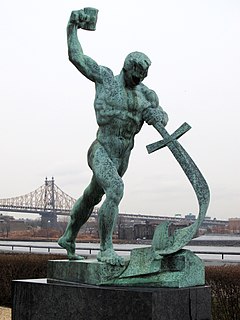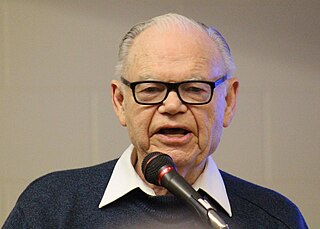Related Research Articles

Nuclear disarmament is the act of reducing or eliminating nuclear weapons. Its end state can also be a nuclear-weapons-free world, in which nuclear weapons are completely eliminated. The term denuclearization is also used to describe the process leading to complete nuclear disarmament.

Disarmament is the act of reducing, limiting, or abolishing weapons. Disarmament generally refers to a country's military or specific type of weaponry. Disarmament is often taken to mean total elimination of weapons of mass destruction, such as nuclear arms. General and Complete Disarmament was defined by the United Nations General Assembly as the elimination of all WMD, coupled with the “balanced reduction of armed forces and conventional armaments, based on the principle of undiminished security of the parties with a view to promoting or enhancing stability at a lower military level, taking into account the need of all States to protect their security.”

The University of Waterloo is a public research university with a main campus in Waterloo, Ontario, Canada. The main campus is on 404 hectares of land adjacent to "Uptown" Waterloo and Waterloo Park. The university also operates three satellite campuses and four affiliated university colleges. The university offers academic programs administered by six faculties and thirteen faculty-based schools. Waterloo operates the largest post-secondary co-operative education program in the world, with over 20,000 undergraduate students enrolled in the university's co-op program. Waterloo is a member of the U15, a group of research-intensive universities in Canada.

Murray McCheyne Thomson was a Canadian peace activist

Nancy Meek Pocock,, known as "Mama Nancy", was a Canadian Quaker who was the 1987 recipient of the Pearson Medal of Peace for her work in disarmament, development and feminism. She was awarded the Order of Ontario in 1992.
Joan Elizabeth Russow is a Canadian peace activist and former national leader of the Green Party of Canada from 1997 to 2001. She is also a co-founder of the Ecological Rights Association and the Global Compliance Research Project.
Douglas James Roche, OC, KCSG is a Canadian author, parliamentarian, diplomat and peace activist. Roche served as Progressive Conservative Member of Parliament (MP) for Edmonton—Strathcona from 1972 to 1979 and for Edmonton South 1979–1984. In 1984, he was appointed Canada's Ambassador for Disarmament, a position he held until 1989. He was appointed to the Senate of Canada on September 17, 1998, where he served until June 13, 2004. Currently he resides in Edmonton, Alberta.

Stockholm International Peace Research Institute (SIPRI) is an international institute based in Stockholm. It was founded in 1966 and provides data, analysis and recommendations for armed conflict, military expenditure and arms trade as well as disarmament and arms control. The research is based on open sources and is directed to decision-makers, researchers, media and the interested public.

Conrad Grebel University College is a university college affiliated with the University of Waterloo in Waterloo, Ontario, Canada. The college is owned by Mennonite Church Eastern Canada and named for early Anabaptist leader Conrad Grebel. Its mission statement reads: "The mission of Conrad Grebel University College is to seek wisdom, nurture faith, and pursue justice and peace in service to church and society."

The Canadian Council of Churches is a broad and inclusive ecumenical body, now representing 26 member churches including Anglican; Eastern and Roman Catholic; Evangelical; Free Church; Eastern and Oriental Orthodox; and Historic Protestant traditions. Together these member churches represent 13,500 worshiping communities and comprise 85% of the Christians in Canada.
Dr. Randall Caroline Forsberg led a lifetime of research and advocacy on ways to reduce the risk of war, minimize the burden of military spending, and promote democratic institutions. Her career started at the Stockholm International Peace Research Institute in 1968. In 1974 she moved to Cambridge, Massachusetts to found the Institute for Defense and Disarmament Studies (IDDS) as well as to launch the national Nuclear Weapons Freeze Campaign. Randall Forsberg was accompanied by an important colleague by the name of Hellen Caldicott while she was leading the Nuclear freeze movement in both Manhattan and Central Park. Both women were met with many challenges in their efforts to lead the Nuclear Freeze Movement. These challenges included gender discrimination and discreditation as influential leaders by the media. Forsberg's strong leadership in the nuclear freeze movement is thought to be very influential in the writing of foreign policy during the Reagan administration and is even credited with catalyzing the negotiation of the INF treaty between President Reagan and Mikhail Gorbachev.
Ceasefire Canada (Ceasefire.ca) was founded in 2003 by Steven Staples and Peter Coombes to prevent Canada from joining the U.S Ballistic Missile Defense program. Staples and Coombes were inspired by the success of web-based campaigns such as Moveon.org. Ceasefire.com was intended to be a web-based tool for citizen action on Canadian government policy. In 2007 Ceasefire.ca moved to the Rideau Institute under the direction of Steven Staples. Over the years it has been involved in a number of campaigns. It was involved in the campaign against the George W. Bush's Star Wars program, it helped push many Canadian politicians to oppose the war in Afghanistan, allowed US war resisters to stay in Canada, called for the ban on deadly cluster bombs, lobbied for the abolishment of nuclear weapons, and worked to prevent the weaponization of space. From its humble beginnings Ceasefire.ca has grown to a membership of 15,000 subscribers who receive online bulletins and take part in online letter writing campaigns. Also, over 1000 have become donors and help fund the organization's campaign work and research activities.
Anti-nuclear organizations may oppose uranium mining, nuclear power, and/or nuclear weapons. Anti-nuclear groups have undertaken public protests and acts of civil disobedience which have included occupations of nuclear plant sites. Some of the most influential groups in the anti-nuclear movement have had members who were elite scientists, including several Nobel Laureates and many nuclear physicists.

The Rideau Institute is a non-profit independent research and advocacy group based in Ottawa. It focusses on foreign policy and defence policy issues.

Religion and peacebuilding refer to the study of religion's role in the development of peace.
Project Ploughshares is a Canadian non-government organization which works to advance policies and actions to prevent war and armed violence and build peace located in the Centre for Peace Advancement at Conrad Grebel University College in Waterloo, Ontario.
Binalakshmi Nepram is a humanitarian, author, and female activist for the advocacy of gender rights and women-led disarmament movements with the objective of arresting gun culture and bringing about peace for her home state of Manipur in particular and northeast India in general. For her contributions in this field to Manipur and northeast India she is known by the epithet "The Face & Voice of North East".

Virginia Gamba de Potgieter is the Special Representative of the Secretary-General of the United Nations for Children and Armed Conflict. She was appointed 12 April 2017 by United Nations Secretary-General António Guterres as the replacement for Leila Zerrougui.

The 2017 Nobel Peace Prize was awarded to the International Campaign to Abolish Nuclear Weapons (ICAN) "for its work to draw attention to the catastrophic humanitarian consequences of any use of nuclear weapons and for its ground-breaking efforts to achieve a treaty-based prohibition on such weapons," according to the Norwegian Nobel Committee announcement on October 6, 2017. The award announcement acknowledged the fact that "the world's nine nuclear-armed powers and their allies" neither signed nor supported the treaty-based prohibition known as the Treaty on the Prohibition of Nuclear Weapons or nuclear ban treaty, yet in an interview Committee Chair Berit Reiss-Andersen told reporters that the award was intended to give "encouragement to all players in the field" to disarm. The award was hailed by civil society as well as governmental and intergovernmental representatives who support the nuclear ban treaty, but drew criticism from those opposed. At the Nobel Peace Prize award ceremony held in Oslo City Hall on December 10, 2017, Setsuko Thurlow, an 85-year-old woman Who survived the 1945 atomic bombing of Hiroshima, and ICAN Executive Director Beatrice Fihn jointly received a medal and diploma of the award on behalf of ICAN and delivered the Nobel lecture.

In international law, Nuclear Weapons Free Zones are areas in which a group of states has prohibited the presence of nuclear weapons, according to criteria set and recognized by the United Nations. On the international level, Canada is not a part of any Nuclear Weapon Free Zone as defined by the United Nations. Canada is a signatory of the Treaty on the Non-Proliferation on Nuclear Weapons, a statute that has similar aims to those of NWFZs and even encourages the establishment of multinational NWFZs, but is not directly comparable. However, certain areas within Canada have voluntarily designated themselves as Nuclear Free Zones (NFZs) or Nuclear Weapons Free Zones (NWFZs). Generally, these nuclear weapons free zones and nuclear free zones are codified within Municipal and Provincial jurisdictions.
References
- 1 2 3 4 "Ernie Regehr". Disarmingconflict.ca. Disarming Conflict. Retrieved 2015-04-16.
- ↑ "Project Ploughshares founder honoured with prestigious peace medal". The Waterloo Region Record. January 21, 2011. Retrieved 2015-04-16.
- ↑ "Ernie Regehr, O.C." Thesimonsfoundation.ca. The Simons Foundation. Retrieved 2015-04-16.
- ↑ "Order of Canada: Ernie Regehr, O.C., B.A., LL.D." GG.ca. The Governor General of Canada. Retrieved 2015-04-16.
- ↑ "Ernie Regehr Awarded Pearson Peace Medal". Councilofchurches.ca. Canadian Council of Churches. January 25, 2011. Archived from the original on April 16, 2015. Retrieved 2015-04-16.
- ↑ "UW 50th Anniversary Alumni Awards". Alumni.uwaterloo.ca. University of Waterloo. Archived from the original on 2012-02-23. Retrieved 2015-04-16.
- ↑ "2008 Awards". Carleton.ca. Arthur Kroeger College. Retrieved 2015-04-16.
- ↑ "Selected Publications by Ernie Regehr". Disarmingconflict.ca. Disarming Conflict. Retrieved 2015-04-16.